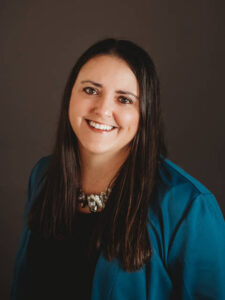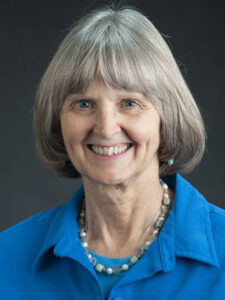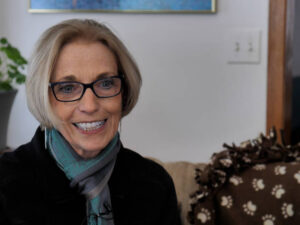Selfless and devoted individuals stepped forward in 2020 with heroic efforts during the COVID-19 pandemic, serving as a continuous source of hope during such difficult times.
Among the devoted public servants was Blugold nursing alumna Jennifer Rombalski, who was honored as Person of the Year by the La Crosse Tribune for her work as the director of the La Crosse County Health Department.
The Tribune’s announcement in January cited Rombalski’s “drive, dedication and refusal to do anything less than her best” in leading the county through the COVID-19 pandemic, noting that her name brought in an overwhelming majority of nominations for the region’s annual recognition.
“I’m truly honored, and so grateful that people have recognized the hard work of our health department,” the 2001 nursing graduate said. “It’s not really me — I just happen to lead a unit of really hard-working, dedicated people.

Jennifer Rombalski, director of the Office of Policy and Practice Alignment at the Wisconsin Department of Health Services’ Division of Public Health. Photo credit: Jodee Zander
”Rombalski’s leadership skills didn’t go unnoticed as she has since accepted a new position as the director of the Office of Policy and Practice Alignment at the Wisconsin Department of Health Services’ Division of Public Health. Among its many responsibilities, the office coordinates the State Health Plan and oversees the state’s five regional offices supporting local-level public health.
“With more than 17 years in local public health, I am excited to have the opportunity to bring my local experiences and a local voice to the senior leadership table in the state health department,” said Rombalski, who is keenly aware of the essential relationships between state and local agencies, especially in matters of public health.
“A strong connection between the state and local health departments is critical for maximum success in improving health for residents across Wisconsin.”
Rombalski, who earned a master’s degree in public health administration from the University of Minnesota in 2016, spent the last five years in La Crosse County, and 17 years total in public health.
Her first job as a Blugold graduate, however, was as a registered nurse at St. Paul’s Gillette Children’s Specialty Healthcare. It was on that same brain and spinal cord injury rehab floor, while still a Blugold student technician, that Rombalski solidified her passion for prevention and public health care.
“As a nurse technician before starting there as an RN, I had one particular patient, a 6-year-old boy, who had a tremendous impact on me,” Rombalski recalled. “He he was riding in the front seat when he and his grandmother were in an automobile accident which caused a spinal cord injury that left him ventilator-dependent for the rest of his life.
“It was so terribly sad, but also very motivating to me,” she said. “I knew from then on that prevention was going to be my true passion as a nurse.”
Early public health roles
In 2004, Rombalski accepted her first position in the public health field, a part-time job as a county public health nurse in Buffalo County, southwest of Eau Claire.
“Although it was a pretty major cut in pay, I was willing to take it as a way to enter the field I felt such conviction for,” she said. “Within two years I became a health officer and then spent eight years there as the public health supervisor for the county.”
It was during that time as the public health supervisor that Rombalski was able to reconnect with the UW-Eau Claire nursing faculty to help establish a clinical program in 2010-11 that would bring senior nursing students to dairy farms to provide basic health care and preventative services to migrant workers.

Dr. Susan Peck, professor emerita and integrative nurse practitioner at the Health Office Co. in Eau Claire
Dr. Susan Peck, professor emerita of nursing and integrative nurse practitioner in Eau Claire, was looking at that time for a way for nursing students with Spanish fluency to incorporate those skills in their pre-service training. She had been Rombalski’s faculty advisor at UW-Eau Claire and knew that Rombalski was working at the Buffalo County Health Department.
“I knew that students with a Spanish language minor would benefit from being able to use the language directly in their nursing practice if they just had a place to practice the two together,” Peck said. “Jennifer understood the need for migrant workers to receive public health care services and education; she knew some of the area farm owners as well as a local resident who was already working with the farms as an interpreter.”
The Health Care for Immigrant and Local Farmers Clinical Immersion Program established at that time continues today under the direction of Dr. Lisa Schiller, associate professor of nursing and director of graduate programs in the College of Nursing and Health Sciences.
“We have included more than 100 nursing students and seen over 500 unique individuals. It is a model program and has been featured in many agricultural magazines and newspapers, and presented at many regional, national and international conferences,” Schiller said.
Rural Wisconsin roots serve the job well
A native of the Eleva-Strum area, Rombalski has lived most of her life in west-central Wisconsin, commuting to jobs in Alma, Baldwin, Chippewa Falls, St. Paul and La Crosse, and has been grateful for the opportunity to give back to both rural and urban communities through public health.
“This is home, this is where we want to give back,” she says about her family’s life in rural Trempealeau County, pointing out that public health concerns do not differ that much between rural and city life.
“There are at-risk populations in both rural and urban areas. The role of public health is to make sure that all populations in our communities have the same opportunity to achieve a healthy life,” she said. “Whether discrepancies in access are based in race, location or finances, we use the data to identify inequities and to create a health plan that can improve communities through better access.”
Rombalski also has learned creative ways to bridge cultural differences when they are making an impact on public health, sparked in part by community outreach she conducted as a Blugold student in what was then the Reading Partners Program with at-risk K-12 students in Eau Claire schools.
“A fellow nursing student and I had the opportunity to work with a young Hmong student in their home,” she recalled. “It was so humbling and eye-opening to learn more about their culture and to feel the deep gratitude of the family for the homework help and language assistance we were able to provide.
“In La Crosse, our department collaborated with UW-La Crosse students to advise the health department in ways to better engage with young people of color in the area, seeking specific ways to improve access to health care in their communities.”
Understanding and appreciating the cultural differences in all populations is an aspect of her work that Rombalski holds as sacred in her commitment to public service.
“We’re all in this world together,” she said. “We have to work with and for one another to maintain a healthy community.”
Key mentor in nursing leadership

Dr. CeCelia Zorn, professor emerita, remains engaged with campus and published a book in 2010 titled “Becoming a Nurse Educator: Dialogue for an Engaging Career.”
While Rombalski does cite previous supervisors in nursing and public health positions, civic leaders in partnering agencies and her parents’ examples of admirable leadership, she names Dr. CeCelia Zorn, professor emerita of nursing, as a primary source of inspiration in terms of leadership.
“I would raise up CeCelia Zorn as one of the people I truly looked up to and admired,” Rombalski said. “She showed such professionalism in her approach to all things, from how she taught to how she communicated. That is one faculty connection I made that really stands out; as a role model, she had a big impact on me.”
Zorn, who retired from UW-Eau Claire in 2012, holds similarly fond memories of Rombalski as a student, recalling a young woman who she says was always a leader.
“A strong advocate for patients, even as a student, Jennifer trusted her findings and her judgment in seeking patient treatment. This reflected a sense of maturity and confidence far beyond the level of a beginning professional,” Zorn said.
“As a graduating senior, Jennifer demonstrated keen self-appraisal skills — she saw herself clearly and honestly, and she used this information to support her own growth,” Zorn recalled. “Jennifer’s roots grew wide and deep. I wanted to learn more from her then and still do now.”
Attributes that Peck recognized in Rombalski over a decade ago are factors that have been key in bringing her to this new role at state-level leadership in public health.
“Jennifer has an appreciation for the big picture. When you can see the bigger picture and work with partners to implement details, you make things happen,” Peck said, noting one more quality she saw in Rombalski. “Jennifer trusts her intuition. It’s one thing to have the facts, but you also need the intuition to trust how to make things work — Jennifer has that.”
